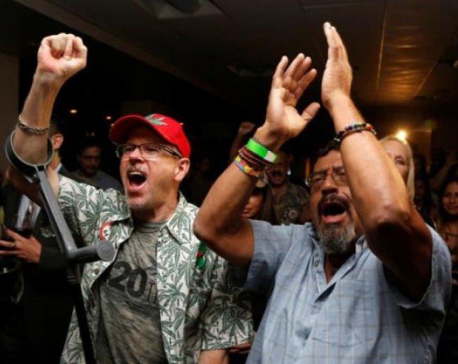
OR
Constitution amendment
Our worst fears are being realized. Over the past one month we have in this space repeatedly emphasized the importance of political consensus—among at least the four major political actors who own up post-2006 changes, namely Nepali Congress, CPN-UML, CPN (Maoist Center) and Madheshi Morcha—in order to amend the constitution.
The country had to pay dearly after one of the four, the Madheshi Morcha, was left out in the final leg of constitution-writing last year. Now, during the second amendment of the constitution, UML, the second biggest party in parliament, is being sidelined. To make matters worse, not all constituent parties of Morcha, for whom the amendments are seemingly being made, are on board the new amendment initiative. UML has threatened to obstruct the House and hit the streets against the revision of the boundaries of province number four and five. The Federal Alliance, which is comprised of various Madheshi and Janajati outfits, for its part has categorically stated that it won’t accept the proposed amendments and will continue to fight tooth and nail against “racial discrimination and caste-based rule”. Meanwhile, protests against boundary revision have flared up in all six districts that have been lopped off province five and into province four.
Constitution amendment will be meaningless, dangerous even, as is being proven, if a broad section of the population is left out of it, or if is done against their express wishes.
Even as the proposed amendments were being discussed over the past couple of weeks, we felt not enough was being done by the NC-Maoist coalition to take the main opposition, UML, into confidence. UML has for a long time been asking for a ‘rationale’ for change in federal boundaries. Some might say that UML, with one eye on the upcoming three sets of elections, would have resisted any amendments proposed by the ruling coalition. True, electoral calculations might be behind UML’s opposition. But it is also true that the UML stand finds resonance in places like Rolpa and Rukum and Arghakhanchi where people are protesting against the ‘unjust’ amendments. Why weren’t they consulted, they are asking, when politicians in Kathmandu were deciding the fate of the place they call home? The rainbow coalition that is the Federal Alliance is also unhappy with the amendments that in their view have not addressed any of their core demands.
Willingly or not, the proposed amendments have once again put the country on the path of confrontation. We believe it is still not too late to work out more credible and acceptable solutions to the old constitution disputes. But this can happen only when there is willingness among all three sides—the ruling coalition, the main opposition and the Madheshi Morcha—to work in the larger national interest, by thinking beyond immediate electoral gains. We thus hope that in the next few days the ruling alliance that has brought the amendment proposal will seriously engage all disgruntled forces, including UML and MPs from disputed districts; at least hear them out and, as far as practicable, also address some of their concerns. Only then should the amendment proceedings be pushed. Otherwise, more confrontation will only embolden extremist forces, at great cost to all mainstream parties.
You May Like This

Let’s live in peace and embrace diversity
The term ‘peace’ comes from the Anglo-French ‘pes’, and the Old French ‘pais’, both meaning “peace, reconciliation, silence, agreement. All... Read More...

California voters embrace recreational marijuana
CALIFIORNIA, Nov 9: A ballot measure to make recreational marijuana legal for adults was headed for approval in California, opening the... Read More...

Palpa farmers embrace mechanization for better yields
PALPA, July 4 :Karna Bahadur Chidi, a farmer of Kaseni in Palpa, stopped tilling his field with oxen seven years... Read More...




Just In
- Govt receives 1,658 proposals for startup loans; Minimum of 50 points required for eligibility
- Unified Socialist leader Sodari appointed Sudurpaschim CM
- One Nepali dies in UAE flood
- Madhesh Province CM Yadav expands cabinet
- 12-hour OPD service at Damauli Hospital from Thursday
- Lawmaker Dr Sharma provides Rs 2 million to children's hospital
- BFIs' lending to private sector increases by only 4.3 percent to Rs 5.087 trillion in first eight months of current FY
- NEPSE nosedives 19.56 points; daily turnover falls to Rs 2.09 billion















Leave A Comment